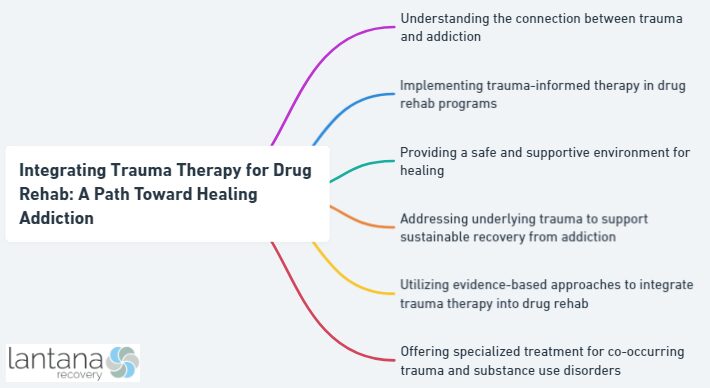Trauma and addiction are often intertwined, creating a complex web of suffering that can be difficult to untangle. Yet, understanding the deep connection between these two issues is a crucial step toward healing and recovery. For those seeking help for drug addiction, addressing the underlying trauma can open the door to a brighter, healthier future. But how can individuals and treatment professionals best approach this challenge?
In this blog post, we’ll delve into the intersection of trauma and substance use disorders, exploring the critical role of trauma therapy for drug rehab. We’ll examine trauma-informed care, therapeutic approaches, and the importance of early intervention, all while shedding light on the steps needed to move forward in the recovery journey.
Key Takeaways
- Addressing trauma is essential for those suffering from substance use disorders due to the high correlation between PTSD and addiction.
- Trauma-informed care creates a safe environment that supports individuals in drug rehab settings, helping them heal and reduce the risk of relapse.
- Therapeutic approaches such as CBT, EMDR & Seeking Safety can be utilized to address trauma, allowing individuals to develop resilience & create sustainable recovery.
Exploring the Intersection of Trauma and Substance Use Disorders
An overwhelming amount of individuals battling addiction, including substance use disorder patients, have also endured trauma, typically manifesting as post-traumatic stress disorder (PTSD) or other traumatic incidents. Substance use disorder treatment is five times more common amongst those diagnosed with PTSD than in the general population, including those with alcohol abuse issues. These distressing statistics underscore the need for a holistic approach to addiction treatment that addresses both trauma and substance use disorders.
The emotional scars left by traumatic experiences often lead individuals to seek solace in drugs or alcohol, which they use to dull their pain, manage PTSD, or evade challenging emotions. As substances become a coping mechanism, they risk spiraling into addiction, further complicating their mental health issues. Therefore, it becomes imperative to address trauma as a fundamental part of any addiction treatment program.
Understanding the Impact of Traumatic Events on Addiction
Traumatic events can take various forms, such as natural disasters, sexual assault, or chronic illness, and can have a profound impact on an individual’s mental health. Unresolved trauma, resulting from a traumatic event, can lead to social isolation, intrusive thoughts and flashbacks, and a hesitance or distrust towards seeking treatment. Prolonged stress from traumatic experiences can also alter the brain’s activity and emotional responses, increasing the risk of developing PTSD and substance abuse.
Therapy plays an integral role in addressing trauma and addiction, with cognitive-behavioral therapy (CBT) being particularly effective in helping individuals acquire new coping strategies and techniques to manage stress. Therapy, which addresses the root trauma and equips individuals with tools to manage emotional pain, can form a crucial part of a holistic addiction treatment plan.

The Role of PTSD in Substance Abuse
Posttraumatic stress disorder, also known as Post-Traumatic Stress Disorder, is a mental health condition that can develop after exposure to traumatic events, with symptoms such as flashbacks, avoidance, and hyperarousal. Individuals with PTSD often use substances to manage their symptoms, inadvertently increasing their risk of developing a substance use disorder. The intertwined nature of PTSD and substance abuse underscores the necessity for specialized therapy that concurrently tackles both conditions.
Seeking specialized treatment programs that address both trauma and addiction is essential for individuals experiencing co-occurring disorders. With the right support and therapeutic interventions addressing the root trauma, individuals can strive for a comprehensive recovery that considers all facets of their mental health.
The Essence of Trauma-Informed Care in Drug Rehab

Trauma-informed care is a transformative approach to drug rehab that focuses on understanding and addressing the effects of trauma on patients. It involves:
-
Recognizing the widespread occurrence and effects of trauma on individuals seeking substance abuse treatment
-
Fostering a safe and supportive environment that encourages trust and empowerment
-
Training staff to understand the effects of trauma and how to respond sensitively and compassionately
This patient-centered approach is designed to provide the best possible care for individuals with a history of trauma.
Incorporating trauma-specific interventions and therapies into the treatment plan is an essential component of trauma-informed care. This includes cognitive behavioral therapy (CBT), eye movement desensitization and reprocessing (EMDR), and group therapies, all of which can help individuals process their traumatic experiences, develop healthy coping mechanisms, and regain control over their lives.
Principles Behind Trauma-Informed Care
Trauma-informed care is guided by six key principles that help create a secure, empathetic, and supportive atmosphere for patients. These principles emphasize understanding symptoms from a strengths-based perspective, reducing the chance of re-traumatizing the patient, and providing trauma-informed supports. Adopting a strengths-based approach allows therapists to empower individuals and instill hope in the possibility of recovery.
Psycho-education is another vital aspect of trauma-informed care, as it helps patients understand how most symptoms associated with trauma and trauma responses are strategies implemented on a biological and cognitive level to protect the individual from potential danger. This knowledge can lead to a transformation in how individuals interact with their symptoms, fostering a sense of hope for recovery.
Implementing Trauma-Informed Practices
To incorporate trauma-informed practices into drug rehab settings, it is essential to create a safe and supportive environment, provide education on trauma and its effects, and involve patients in their own care. Effective training methods for staff in trauma-informed care include trauma-informed reflective practice, establishing training standards, hosting seminars or workshops, and paying attention to language.
The implementation of trauma-informed practices in drug rehab settings can:
- Create a healing environment through wellness therapy for drug rehab that promotes resilience and recovery for individuals with trauma histories
- Reduce the risk of relapse
- Improve overall outcomes for individuals in drug rehab settings
By addressing both the trauma and addiction aspects of an individual’s condition, trauma-informed practices offer a comprehensive and integrated approach to care.
Therapeutic Approaches to Address Trauma in Addiction Treatment

A variety of therapeutic approaches are available to address trauma in addiction treatment, each offering unique benefits and strategies for healing. Cognitive Behavioral Therapy (CBT), Eye Movement Desensitization and Reprocessing (EMDR), and group therapies, such as Seeking Safety, are among the most effective techniques used to process traumatic experiences and develop coping strategies.
Incorporating these therapeutic approaches into addiction treatment enables individuals to process their traumatic experiences, build resilience, and diminish their dependency on substances as a coping mechanism. In doing so, they can pave the way for a more sustainable and fulfilling recovery.
Cognitive Behavioral Therapy (CBT)
Cognitive Behavioral Therapy (CBT) is a powerful tool for addressing both trauma and addiction. It focuses on the connection between thoughts, feelings, and behaviors, helping individuals recognize and alter negative thought patterns and develop healthier coping strategies. CBT is a successful treatment modality for both trauma and addiction and is often used in combination with other therapeutic approaches.
When dealing with trauma and addiction, CBT typically integrates cognitive restructuring or reframing, guided discovery, and thought challenging exercises. These techniques can help individuals process their traumatic experiences, develop new coping mechanisms, and build resilience, ultimately paving the way for a more sustainable and fulfilling recovery.
Eye Movement Desensitization and Reprocessing (EMDR)
Eye Movement Desensitization and Reprocessing (EMDR) is a psychotherapeutic technique used to treat trauma-related disorders, particularly PTSD. It involves the patient briefly focusing on the traumatic memory while simultaneously experiencing bilateral stimulation, such as eye movements, taps, or sounds. This process is thought to help the brain reprocess the traumatic memory and reduce its emotional intensity.
Research has demonstrated EMDR to be effective in reducing symptoms of trauma and promoting healing. By addressing the underlying trauma that contributes to substance abuse, EMDR can play a pivotal role in helping individuals develop healthier coping strategies and reduce their reliance on substances as a means of self-medication.
Seeking Safety and Other Group Therapies
Group therapies, such as Seeking Safety, can play a vital role in aiding recovery from trauma and addiction. They offer a safe and understanding environment in which individuals can gain:
- Support
- Connection
- Shared experiences
- Skills
- Accountability
The primary focus of Seeking Safety is to cultivate resilience and teach coping strategies to address symptoms of trauma, rather than delving into trauma narratives.
Studies have shown that Seeking Safety and other group therapies can lead to positive treatment outcomes, including reduced PTSD symptoms and substance use behavior. These group therapies can provide essential support and promote resilience among patients with trauma and addiction, helping individuals feel less alone and providing a sense of community.
Recognizing Symptoms: When to Seek Trauma Therapy in Drug Rehab
Recognizing the symptoms of PTSD and substance abuse is crucial to ensure timely intervention and appropriate treatment. Individuals with PTSD may experience:
- Flashbacks
- Avoidance
- Mood fluctuations
- Alterations in behavior
These symptoms can contribute to substance abuse. Addressing both the trauma and addiction facets of an individual’s condition allows for comprehensive assessments to plan the most efficient course of action.
Understanding the signs and symptoms of PTSD and substance abuse can empower individuals to seek the help they need, paving the way for a more fulfilling and sustainable recovery. By acknowledging the issue and seeking help, individuals can begin to address the underlying trauma and addiction, taking the necessary steps toward healing and recovery.
Identifying PTSD and Substance Abuse Symptoms
Identifying the signs and symptoms of PTSD and substance abuse is a critical first step in addressing the complex needs of individuals with co-occurring disorders. Common symptoms of PTSD that can contribute to substance abuse include:
- Self-medication
- Heightened risk-taking behavior
- Avoidance
- Co-occurring mental health disorders
- Hyperarousal
It is essential to be aware of these symptoms and to seek help when necessary. Comprehensive assessments can provide invaluable insight into the unique challenges faced by individuals with PTSD and substance abuse, helping to guide the development of an effective treatment plan tailored to their needs.
The Importance of Early Intervention
Early intervention is crucial in improving treatment outcomes for individuals with trauma and addiction. By addressing both the trauma and addiction aspects of an individual’s condition, early intervention can help mitigate the severity of addiction and optimize treatment outcomes. Studies have demonstrated that early intervention can help avert the development of addiction, as well as lead to higher rates of recovery and reduced relapse rates.
Postponing therapy for trauma and substance abuse may result in:
- Heightened risk of addiction
- Exacerbated symptoms
- Emergence or exacerbation of co-occurring mental health issues
- Impaired relationships and social functioning
- Detriment to overall well-being
Recognizing the symptoms of PTSD and substance abuse and seeking help early in the process can greatly improve the chances of a successful recovery.
Comprehensive Treatment for Co-Occurring Disorders

Comprehensive treatment for co-occurring disorders involves a holistic approach that addresses both the mental health and substance use disorders of an individual. This approach includes a combination of individual therapy, medical detox, and inpatient treatment to effectively address the complex needs of individuals with co-occurring disorders.
A comprehensive treatment that addresses both the trauma and addiction facets of an individual’s condition can lay a solid foundation for a more fulfilling and long-lasting recovery. Through this integrated approach, individuals can work toward:
- Healing from their traumatic experiences
- Developing healthy coping mechanisms through life skills therapy
- Building resilience
- Ultimately reducing their reliance on substances as a coping mechanism.
Integrating Individual Therapy Sessions
Individual therapy sessions provide a secure and encouraging environment for individuals to investigate and process their traumatic experiences. Therapists help clients comprehend the relationship between trauma and addiction, and how trauma may have played a role in the development of addictive behaviors. Through various therapeutic approaches, such as cognitive-behavioral therapy (CBT) and eye movement desensitization and reprocessing (EMDR), therapists assist people in processing and healing from their trauma, reducing the emotional intensity connected with traumatic memories.
Individual therapy that addresses trauma alongside addiction enhances the likelihood of prolonged recovery, minimizes relapse rates, and boosts overall well-being. The integration of individual therapy sessions into a comprehensive treatment plan is essential for addressing the unique needs of individuals with co-occurring disorders.
The Necessity of Medical Detox and Inpatient Treatment
Medical detox is an essential component in the treatment of co-occurring disorders, as it provides a secure and monitored environment for individuals to withdraw from substances. This initial stage facilitates the management of physical withdrawal symptoms and guarantees the safety of the individual during the process. By attending to the substance abuse component of co-occurring disorders, medical detox establishes the basis for subsequent treatment and therapy to address the mental health issues at hand.
Inpatient treatment is essential for providing comprehensive and integrated care for individuals with co-occurring disorders. It offers a structured and supportive environment where individuals can receive simultaneous treatment for both their mental health and substance use disorders. In addition, inpatient treatment provides access to evidence-based therapies and interventions, such as cognitive-behavioral therapy and motivational enhancement therapy, which are necessary for addressing the complex needs of those with co-occurring disorders.
Overcoming Barriers to Treatment: Insurance and Access
Navigating the complexities of insurance coverage and access to appropriate care can be a daunting task for many patients seeking help for substance use disorders. However, overcoming these barriers is essential in ensuring that individuals receive the support and treatment they need to begin their journey toward recovery. Many substance use disorder treatment providers, such as Green Hill Recovery, collaborate with major insurance providers, making it easier for patients to access the care they need.
Individuals can overcome barriers to accessing substance use disorder treatment by seeking help from helplines, exploring alternative treatment options, and leveraging community resources. With determination and support, it is possible to overcome these barriers and access the life-changing care needed for a successful recovery journey.
Moving Forward: Taking the Steps Toward Recovery
Taking the necessary steps toward recovery and healing from trauma and addiction can be a challenging yet rewarding process. By recognizing the problem and seeking help at Lantana Drug Rehab, individuals can start addressing the root causes of trauma and addiction, and work towards regaining control over their lives. Some important steps in the recovery process include:
- Participating in therapy and counseling to address trauma and addiction
- Developing healthy coping mechanisms and stress management techniques
- Building a support network of friends, family, and support groups
- Making lifestyle changes such as adopting a healthy diet and exercise routine
By taking these steps, individuals can begin their journey towards recovery and healing.
Embracing the healing process and maintaining sobriety is essential for long-term recovery. With the right support, guidance, and determination, individuals can overcome the challenges of trauma and addiction, paving the way for a brighter and healthier future.
Summary
In conclusion, addressing the complex relationship between trauma and addiction is essential for a comprehensive and effective treatment plan. By incorporating trauma-informed care, therapeutic approaches such as CBT and EMDR, and early intervention, individuals can work towards healing from their traumatic experiences and developing healthier coping mechanisms to overcome addiction.
As we have explored in this blog post, understanding the intersection of trauma and substance use disorders, embracing trauma-informed care, and taking the necessary steps toward recovery are all crucial elements in the journey towards healing and lasting change. With determination, support, and the right guidance, individuals can overcome the challenges of trauma and addiction, paving the way for a brighter and more fulfilling future.
Frequently Asked Questions
What are the top 3 forms of trauma that link to addiction?
Trauma is a key factor in addiction, and the top three forms of trauma that can link to addiction are Adverse Childhood Experiences, PTSD, and both Physical and Emotional Trauma.
Is there a correlation between trauma and substance abuse?
There is a clear correlation between trauma and substance abuse; many people with addictions have experienced at least one traumatic event, showing that different types of trauma can lead to addiction.
Is trauma the root cause of addiction?
Trauma has been linked to addiction, and many people struggling with addiction have experienced at least one traumatic event in their life. Thus, it is reasonable to conclude that trauma can be a root cause of addiction.
What are the best practices for trauma treatment?
Best practices for trauma treatment include Cognitive Behavioral Therapy (CBT), Prolonged Exposure Therapy (PE), Cognitive Processing Therapy (CPT), Trauma-Focused Cognitive Behavioral Therapy (TF-CBT), Eye Movement Desensitization and Reprocessing Therapy (EMDR), and the use of medications.
How does trauma-informed care help in addiction treatment?
Trauma-informed care creates a secure and empowering space, enabling clients to tackle both addiction and its underlying causes. It also provides specialized therapies to support lasting recovery.



